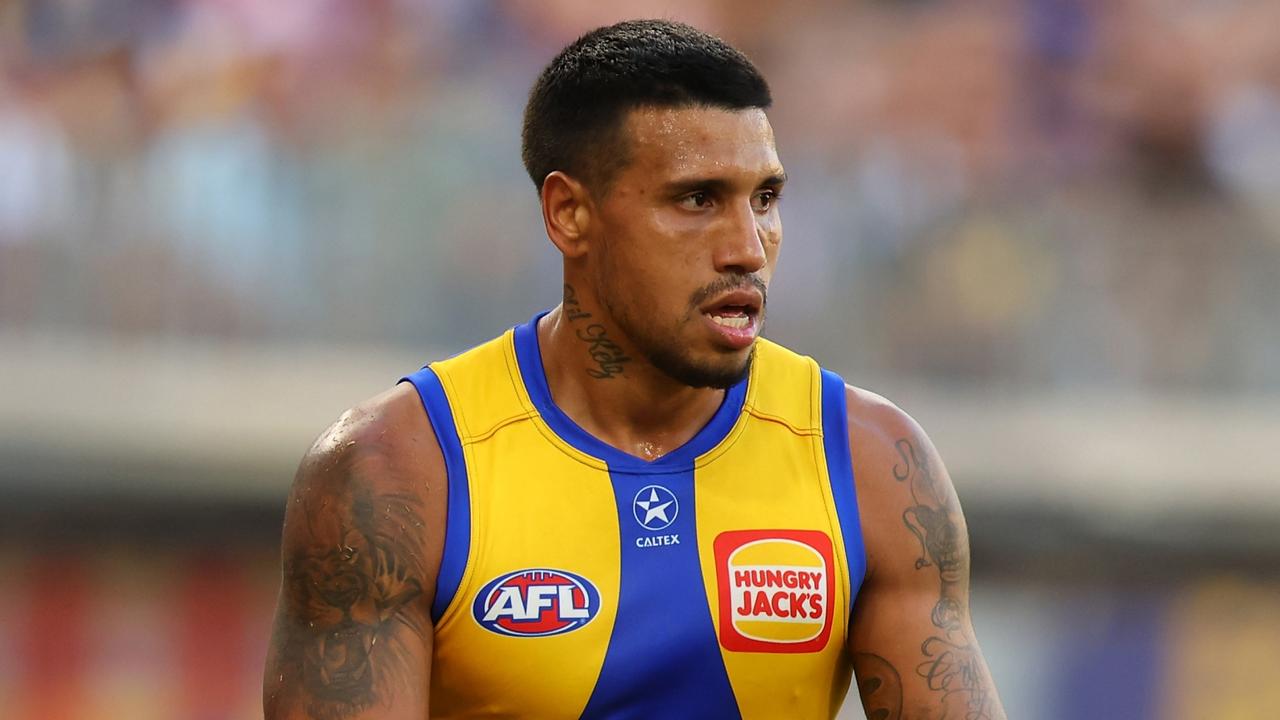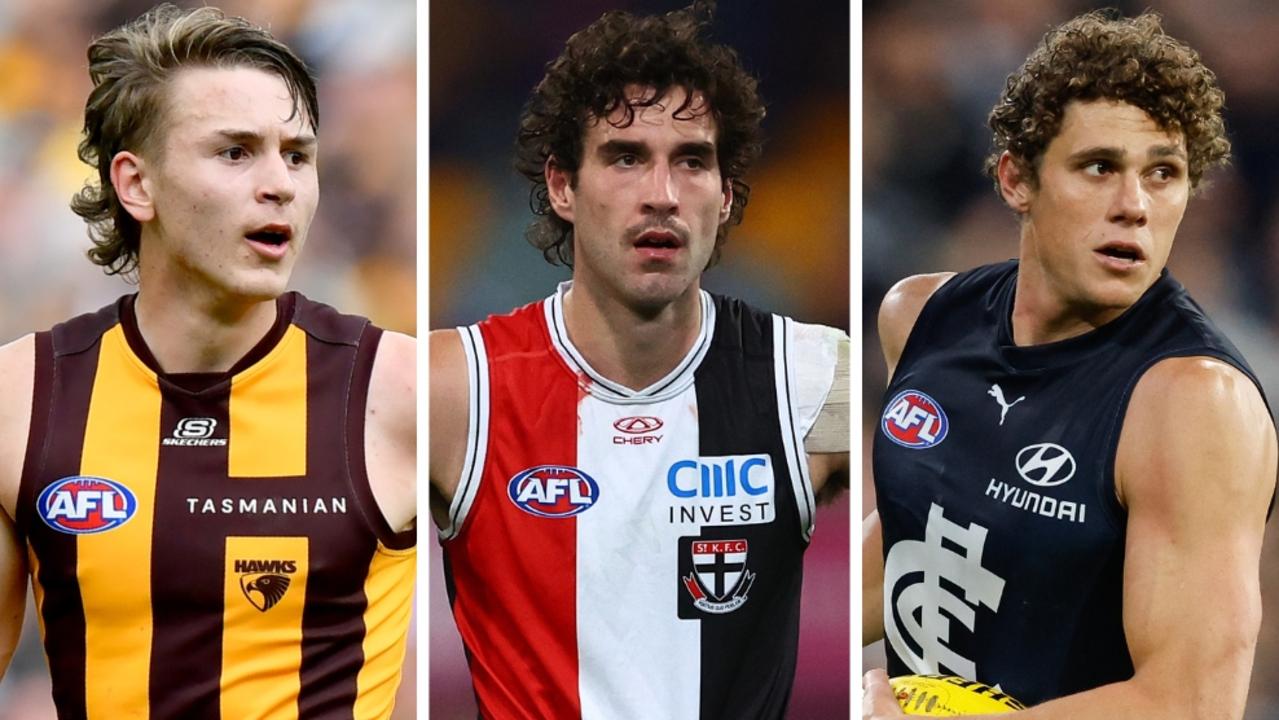AFL 2021: The AFL soft cap squeeze has pushed coaches at all levels to an alarming tipping point – and more could walk away
The ever-increasing stress and scrutiny of coaching an AFL side has prompted concerns within the industry that many will throw in the towel sooner than later.
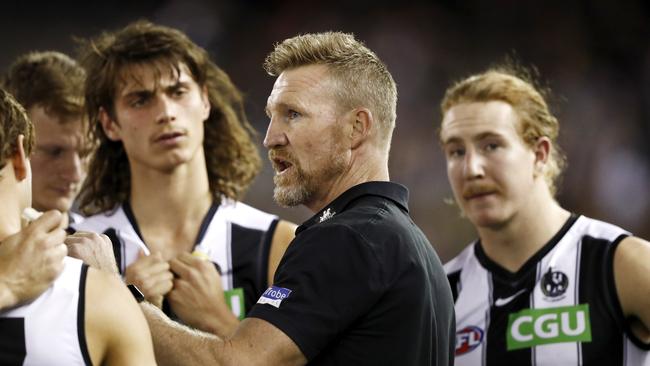
AFL News
Don't miss out on the headlines from AFL News. Followed categories will be added to My News.
Justin Leppitsch has noticed an exhausted, almost beaten look in the eyes of a few AFL coaches this season.
Quite frankly, that look scares him.
He’s seen it before across almost 30 years at the highest level, as a three-time premiership champion with Brisbane, a sacked Lions senior coach, and a senior Richmond assistant coach who helped shape a modern dynasty.
Leppitsch had seen it in the mirror too, during those dire days when he was the Brisbane Lions’ head coach and feeling the blowtorch.
But, in 2021, the look seems more widespread and worrying, and has filtered down from the senior coaches to the assistants.
Watch the 2021 Toyota AFL Premiership Season. Every match of every round Live on Kayo. New to Kayo? Try 14-Days Free Now >
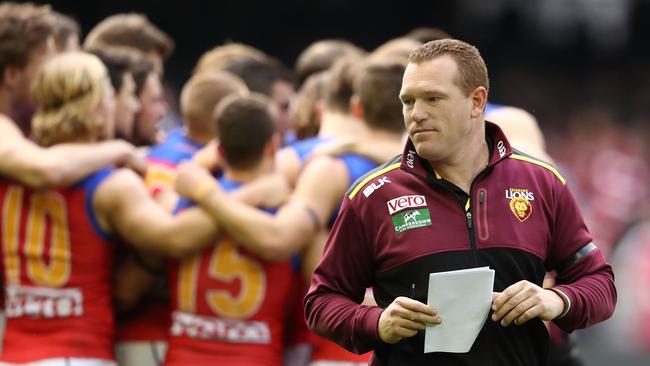
Having left the industry of his own accord at the end of last year — largely because of a slashing of coaches’ salaries in AFL’s soft cap crackdown due to the COVID pandemic — Leppitsch feels for those left behind.
They are working longer, harder, under more scrutiny and on significantly reduced wages.
A handful have told him they, too, are considering moving on in the short-to-medium term.
“I can see it (the pressure) in some of the coaches now,” Leppitsch said. “I can see it in their eyes … they look beaten.
“There is a bad vibe about coaching at the moment.
“I know for a fact that (some) coaches of my demographic are tossing up their futures. I am talking to very good coaches, experienced good people, who are genuinely weighing it up.”
AFL coaching at every level is feeling a squeeze like never before.
Leppitsch could hear the whirl of this crisis coming for the past five seasons, with the AFL desperate to reduce what it thought was an explosion of club football department spending.
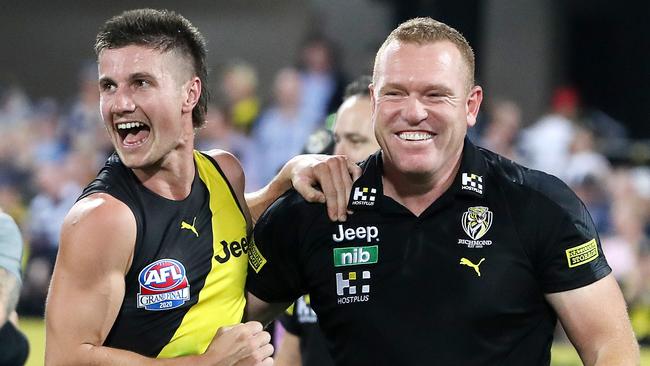
But COVID and its resulting soft cap cutbacks have hit footy departments with the ferocity of a freight train.
AFL football department soft caps have been slashed from $9.7 million per club to $6.2 million, with coaches “smacked” financially and also from a workload/welfare perspective.
The AFL soft cap includes senior, assistant and development coaching salaries as well as other roles in football departments.
But it also accounts for a raft of other expenditure such as GPS units, players’ food and medical/physiotherapy operations.
Coaches have borne the brunt of most of the cuts.
A number of highly-experienced mentors such as Leppitsch, and former St Kilda star and ex-Greater Western Sydney assistant coach Lenny Hayes, have opted to chase a life outside the AFL bubble.
Others didn’t have a choice.
More than 60 coaches lost their jobs on the back of the pandemic — reduced from around 180 to about 120 in the league — while the salaries of those remaining were slashed by an average of between 20 to 30 per cent.
While many others remaining in the game, notably the players, some administration staff and even AFL executives, have been restored to almost pre-pandemic pay levels, the coaches haven’t.
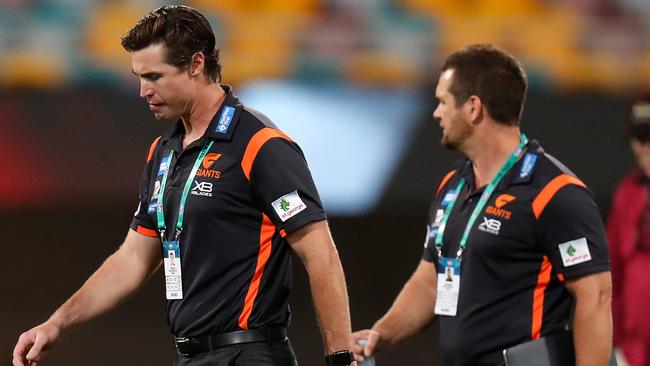
Unlike the players, the coaches don’t have a collective bargaining agreement.
“The soft cap, for me, was the final straw to go, ‘Maybe it is time to try something else’,” Leppitsch said.
“COVID brought upon that.
“Without COVID and the soft cap (cuts), I would have thought I would still be in footy now.
“What has happened … is that the job has gotten harder. There is no hazard pay anymore.
“When you do a job that is either high risk to your own health, or a risk to your family’s health, because you are getting criticised publicly, or your kids are being picked on at school, or you are working very long hours, there should be some hazard pay in that.
“You can’t just say, ‘Yes, but it is good pay’. The other thing is you might only be in it for three years and you cop absolute grief and you might leave with your reputation tarnished.”
That hasn’t happened to Leppitsch.
He’s now doing some property work, media and some corporate roles, and is coach of the Peninsula Grammar 1st XVIII team.
He remains appreciative of what football has provided for him and his family, and he understands many Australians are worse off financially due to the pandemic.
But as a person who still loves the game, and who cares for its participants, he remains worried about what might happen to coaching in the future if something doesn’t change.
COUNTING THE COST
An AFL senior coaching role has often been compared to the ultimate thrill ride.
There has always been a long queue of those wanting to climb aboard as it has always been one of the most sought after roles in football.
But for every exhilarating, almost intoxicating, twist and turn of the rollercoaster, the pitfalls and the plunges can be damaging.
Some of those dips have proven life-changing.
Even before the pandemic hit, there was industry-wide concern about the impact senior coaching had on some of the game’s biggest names.
Former Richmond coach and one-time AFL Coaches’ Association chief executive Danny Frawley took his own life; ex-Essendon coach James Hird survived an overdose; while Mark “Bomber” Thompson and Dani Laidley battled drug problems.
There have been others who have suffered in silence through their own mental and physical health concerns.
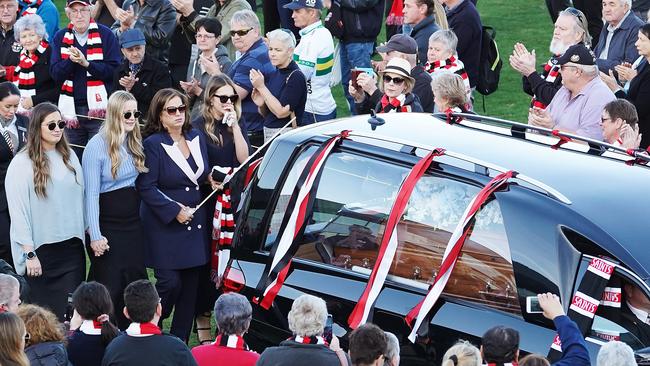
The recent fallout led four-time premiership coach Alastair Clarkson to express his concerns late last year.
“Hirdy, ‘Bomber’ Thompson, ‘Bails’ (Dean Bailey), ‘Walshy’ (Phil Walsh), ‘Laids’, ‘Spud’ Frawley, ‘Pykey’ (Don Pyke) and now Rhyce Shaw, and there are probably others who have done it tough,” Clarkson said.
“Some have lost their lives, not directly because of coaching, but some of it has been stress related.”
The most recent came in late 2020 when Rhyce Shaw stepped down as North Melbourne senior coach, having earlier taken personal leave to deal with a mental health issue.
The pressure of being a young coach in his first full season had been exacerbated by the all-consuming hub experience as he tried to keep his struggling side connected during footy’s most taxing season.
Thankfully, more than six months on, Shaw is back in the AFL system again, in a Gold Coast development role as their enthusiastic runner.
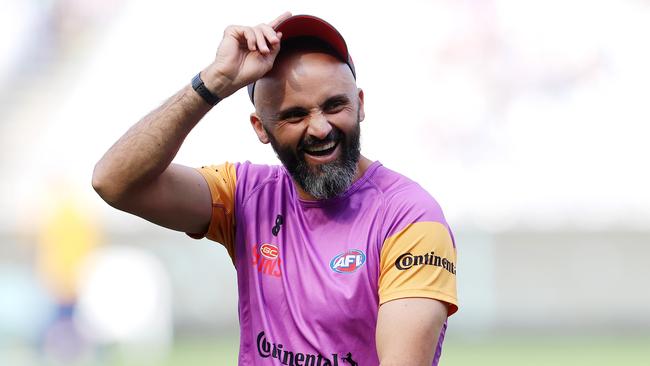
His love for the game has won out, even if his battle shone a painful light on the extraordinary pressures of modern coaching.
Media and fan scrutiny has never been more intense; social media can sometimes prove especially toxic.
The toll on their families cannot be underestimated.
Three senior coaches — Damien Hardwick, Nathan Buckley and Simon Goodwin — had marriage breakdowns across the past 12 months.
Those associated with coaching hope this is an outlier, given there had only been a few other instances in the previous decade.
TIPPING POINT
The AFL’s senior coaches are united in a belief that the league needs to look at the workloads and wages of all levels of club football departments.
They understand changes had to be made due to the pandemic, but fear the cuts have been far too savage.
They are mostly worried about those people working underneath them.
Sydney coach John Longmire, a strong mental health advocate, spoke about it passionately at his press conference this week.
“There’s a trim with a knife, then there’s a cut with a chainsaw. I’m not sure we’ve got the mix quite right,” Longmire said.
“The real challenge ... is there’s a lot of really good people working in the industry. But they’re working enormous hours and putting themselves, and their families in some cases, under some stress.
“There has to be an acknowledgment from the AFL, that that’s the case. It’s not about getting the violin out, it’s just a fact.”
Geelong coach Chris Scott was just as emphatic.
“The environment we’re in at the moment is unsustainable, and even more than that, it’s not right,” Scott said. “It’s just not right the whack that footy departments have taken in comparison to everyone else.”
“We’ve got the same number of players, exactly the same workload — it increases every year, if feels, with 37 per cent less resources.
“There’s no cap on AFL administration or club administration, there’s a cap on football departments.”
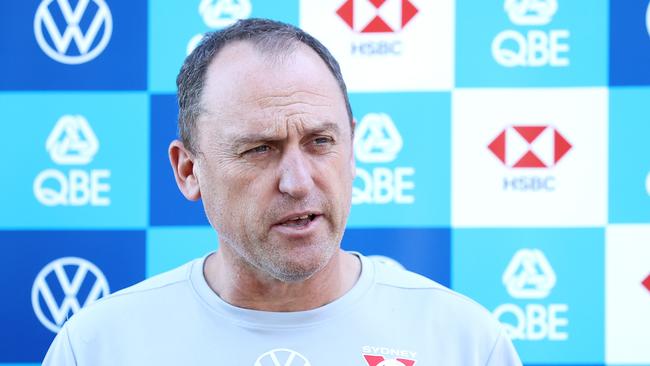
It is understood some senior coaches are each working more than 70 hours per week which accounts for match-day coaching, training and meetings throughout the week, opposition analysis, game preparation, game reviews and coding, planning, two locked-in media appearances each week, planning short and long term, discussions with players, officials and the board, travelling time (if playing interstate), plus calls and emails outside the club.
Most have only two weeks’ annual leave a year, given the 24/7 cycle of the AFL calendar.
Assistant coaches and other football department staffers are also working overtime.
Some have taken on extra roles internally to give clubs “more bang for their (soft cap) buck”.
A few have even been working part-time jobs to help pay mortgages and children’s school fees, given the unexpected recent dip in salaries.
While all clubs use their soft cap differently, top level assistant coaches who used to earn between $220,000 to $230,000 have been cut back to $160,000 to $180,000.
Average assistant coaches who were on approximately $180,000 are now down to $130,000 to $140,000.
Development coaches who used to earn around $120,000, but are now mostly on $90,000.
The senior coaches know the backdrop of financial sacrifice in Australia across all industries and don’t want to be seen to be whingeing, given how hard others are doing it as well.
But when so many other levels of football have gone back to pre-pandemic levels, it is frustrating that coaching has reached a tipping point.
LOSING THE BEST
Geelong midfielder and AFL Players’ Association president Patrick Dangerfield fears more experienced coaches will leave the game, which would have an impact on the players and the standards.
“We all understand the reasons for the cuts that happened last season, but by the end of the year it was widely recognised that we were nowhere near the dire financial position that was forecast initially,“ Dangerfield said on SEN.

“We have gone hard in some areas, perhaps we need to pull back and make sure we continue to look after our people who not only shape our game, but who are the faces of our game.
“We run the real risk of losing great people within the game. It (coaching) is not all champagne and roses. It is a bloody hard caper and the other side (out of football) is appealing when you don’t have all the stress that comes with being a senior (or assistant) coach.”
Mark Brayshaw had a blunt message when he resigned in January as AFL Coaches’ Association CEO after six years.
He said if the industry did not manage the workload on senior/assistant coaches, the burnout would only escalate.
“I have always been lost in admiration for the pastoral care football clubs put in place for the players and the empathy coaches have for them,” Brayshaw said.
“I have seen that as a parent of boys (playing AFL football) as much as in my last job.
“The two thirds of coaches who have remained in the job are working (harder than before). They are beautiful people … quite frankly the industry needs to start taking care of them.”
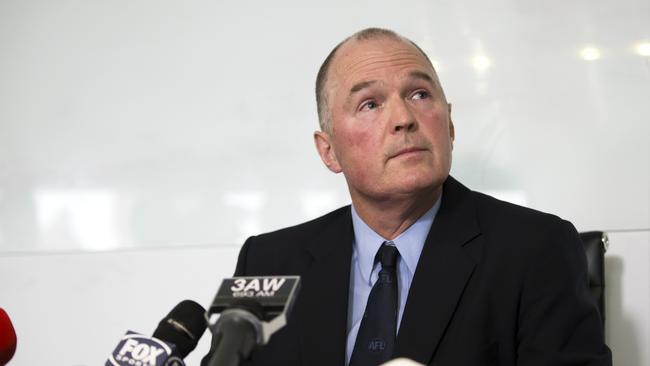
Alistair Nicholson, who is Brayshaw’s successor at the AFL Coaches’ Association, is working towards that objective.
Nicholson said: “The $63 million soft cap cut has serious ongoing implications for the wellbeing of coaches, the capacity to properly support players and the quality of the game.”
“We are in active discussions with the AFL and I am confident they are aware of the seriousness of the problem and the need to resolve it.”
While the coaches felt at times that their concerns had fallen on deaf ears at AFL headquarters, there appears to be a slight softening in the league’s public messaging, at least.
But while the AFL is in the midst of a review, no one expects to see a rapid rise in soft cap numbers.
The rise is expected to be marginal, and is unlikely to push beyond $7 million.
“I think people understand that we’re still going to be forecasting down $280 million in revenue across the industry this year,” AFL chief executive Gillon McLachlan said.
“But there are areas where we’ve cut deeply that need to be looked at.
“The health and wellbeing of everyone in our industry is a complete priority and we will do what we need to do to address that.
“We’re having the right conversations, whether it’s with clubs, footy departments, coaches association, coaches, others directly.
“We’ve also got to work within the competing priorities as we build back up as we get to 100 per cent.”
The fear is until that happens, those working at the coalface will remain at risk, and those experienced coaching mentors out of the industry, such as the highly-regarded Leppitsch, won’t be tempted back.
More Coverage
Originally published as AFL 2021: The AFL soft cap squeeze has pushed coaches at all levels to an alarming tipping point – and more could walk away



